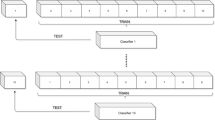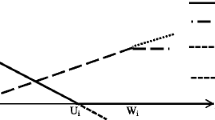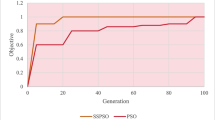Abstract
This research focuses on the role of internal factors in small and medium-scale supply chains in developing countries, enhancing the product completion time in fuzzy conditions. In this research, a 3-phase fuzzy-based framework is proposed to address the product completion time problem. In the first phase, using quantitative research, human resource, machinery, material, technology, and social environment are identified as the group factors that can have the most impact on product completion time. Then, in the next phase, a supervised machine-learning algorithm is proposed to classify the production alternatives according to their actual status of the effective internal factor. Then, in the third phase, a new fuzzy-based heuristic is developed to generate production alternatives and evaluate and select the best one. The outcomes show that the layout (0.636), material (0.602), maintenance (0.584), human resource (0.56), and technology (0.553) affect the product completion time, respectively. The findings also indicated that the proposed Fuzzy-TOPSIS heuristic is capable of reducing the product completion time in a range between 0 and 10.3%.





















Similar content being viewed by others
Explore related subjects
Discover the latest articles, news and stories from top researchers in related subjects.Notes
https://www.statista.com/statistics/318732/share-of-economic-sectors-in-the-gdp-in-malaysia/. Retrieved in 01/08/2020.
https://www.ceicdata.com/en/malaysia/number-of-bankruptcies/number-of-bankruptcies. Retrieved in 01/08/2020.
References
Senthil Kumar, P.: A simple method for solving type-2 and type-4 fuzzy transportation problems. Int. J. Fuzzy Logic Intell. Syst. 16(4), 225–237 (2016)
Kumar, P.S., Hussain, R.J.: A method for finding an optimal solution of an assignment problem under mixed intuitionistic fuzzy environment. In: Proceedings in International Conference on Mathematical Sciences (ICMS-2014) (2014).
Xu, R., et al.: Two kinds of ant colony algorithms to minimize the total completion time for batch scheduling problem. Comput. Integr. Manuf. Syst. 16(6), 1255–1264 (2010)
Irdem, D.F., Kacar, N.B., Uzsoy, R.: An exploratory analysis of two iterative linear programming—simulation approaches for production planning. IEEE Trans. Semicond. Manuf. 23(3), 442–455 (2010)
Ramezanian, R., Rahmani, D., Barzinpour, F.: An aggregate production planning model for two phase production systems: Solving with genetic algorithm and tabu search. Expert Syst. Appl. 39(1), 1256–1263 (2012)
Shah, N.K., Ierapetritou, M.G.: Integrated production planning and scheduling optimization of multi-site, multi-product process industry. Comput. Chem. Eng. 37, 214–226 (2012)
Ning, Y., Liu, J., Yan, L.: Uncertain aggregate production planning. Soft. Comput. 17(4), 617–624 (2013)
Wang, S.-C., Yeh, M.-F.: A modified particle swarm optimization for aggregate production planning. Expert Syst. Appl. 41(6), 3069–3077 (2014)
Díaz-Madroñero, M., Mula, J., Peidro, D.: A review of discrete-time optimization models for tactical production planning. Int. J. Prod. Res. 52(17), 5171–5205 (2014)
Gansterer, M., Almeder, C., Hartl, R.F.: Simulation-based optimization methods for setting production planning parameters. Int. J. Prod. Econ. 151, 206–213 (2014)
Rossi, T., et al.: Improving production planning through finite-capacity MRP. Int. J. Prod. Res. 55(2), 377–391 (2017)
Wang, J., et al.: Big data driven cycle time parallel prediction for production planning in wafer manufacturing. Enterp. Inf. Syst. 12(6), 714–732 (2018)
Rauch, E., Dallasega, P., Matt, D.T.: Complexity reduction in engineer-to-order industry through real-time capable production planning and control. Prod. Eng. Res. Devel. 12(3–4), 341–352 (2018)
Rubaiee, S., Yildirim, M.B.: An energy-aware multi-objective ant colony algorithm to minimize total completion time and energy cost on a single-machine preemptive scheduling. Comput. Ind. Eng. 127, 240–252 (2019)
Huang, J., Chang, Q., Arinez, J.: Product completion time prediction using a hybrid approach combining deep learning and system model. J. Manuf. Syst. 57, 311–322 (2020)
Hammadi, L., et al.: Integrated model based on extended fuzzy AHP and criticality analysis for risk assessment in customs supply chain: a perspective from morocco. Int. J. Ind. Eng. 27(2), 181–208 (2020)
Erol, R., et al.: A multi-agent based approach to dynamic scheduling of machines and automated guided vehicles in manufacturing systems. Appl. Soft Comput. 12(6), 1720–1732 (2012)
Gen, M., Lin, L.: Multi-objective evolutionary algorithm for manufacturing scheduling problems: state-of-the-art survey. J. Intell. Manuf. 25(5), 849–866 (2014)
Kapanoglu, M., et al.: A pattern-based genetic algorithm for multi-robot coverage path planning minimizing completion time. J. Intell. Manuf. 23(4), 1035–1045 (2012)
Li, K., Leung, J.-T., Cheng, B.-Y.: An agent-based intelligent algorithm for uniform machine scheduling to minimize total completion time. Appl. Soft Comput. 25, 277–284 (2014)
Angius, A., Horváth, A., Colledani, M.: Moments of accumulated reward and completion time in Markovian models with application to unreliable manufacturing systems. Perform. Eval. 75, 69–88 (2014)
Mokhtari, H., Salmasnia, A.: An evolutionary clustering-based optimization to minimize total weighted completion time variance in a multiple machine manufacturing system. Int. J. Inf. Technol. Decis. Mak. 14(05), 971–991 (2015)
Li, Z., Tang, Q., Zhang, L.: Minimizing energy consumption and cycle time in two-sided robotic assembly line systems using restarted simulated annealing algorithm. J. Clean. Prod. 135, 508–522 (2016)
Costa, A., Cappadonna, F.A., Fichera, S.: Minimizing the total completion time on a parallel machine system with tool changes. Comput. Ind. Eng. 91, 290–301 (2016)
Chen, X.-J., et al.: An automatic optimization method for minimizing supporting structures in additive manufacturing. Adv. Manuf. 8(1), 49–58 (2020)
Delgoshaei, A., Ali, A.: Review evolution of cellular manufacturing system’s approaches: human resource planning method. J. Proj. Manag. 4(1), 31–42 (2019)
Süer, G.A., et al.: Minimizing total tardiness subject to manpower restriction in labor-intensive manufacturing cells. Math. Comput. Model. 57(3–4), 741–753 (2013)
Delgoshaei, A., Ali, A.: An applicable method for scheduling temporary and skilled-workers in dynamic cellular manufacturing systems using hybrid ant colony optimization and tabu search algorithms. J. Ind. Prod. Eng. 34(6), 425–449 (2017)
Satoglu, S.I., Suresh, N.C.: A goal-programming approach for design of hybrid cellular manufacturing systems in dual resource constrained environments. Comput. Ind. Eng. 56(2), 560–575 (2009)
Delgoshaei, A., Ariffin, M.K.A., Ali, A.: A multi-period scheduling method for trading-off between skilled-workers allocation and outsource service usage in dynamic CMS. Int. J. Prod. Res. 55(4), 997–1039 (2017)
Ounnar, F., Pujo, P.: Pull control for job shop: holonic manufacturing system approach using multi-criteria decision-making. J. Intell. Manuf. 23(1), 141–153 (2012)
Cesaní, V.I., Steudel, H.J.: A study of labor assignment flexibility in cellular manufacturing systems. Comput. Ind. Eng. 48(3), 571–591 (2005)
Li, Q., et al.: Multi-objective optimal cross-training configuration models for an assembly cell using non-dominated sorting genetic algorithm-II. Int. J. Comput. Integr. Manuf. 25(11), 981–995 (2012)
Liu, Y., et al.: Workload-based multi-task scheduling in cloud manufacturing. Robot. Comput. Integr. Manuf. 45, 3–20 (2017)
Kumar, P.S.: PSK method for solving intuitionistic fuzzy solid transportation problems. Int. J. Fuzzy Syst. Appl. (IJFSA) 7(4), 62–99 (2018)
Castellano, J.M., et al.: Study on the effects of raw materials composition and pelletization conditions on the quality and properties of pellets obtained from different woody and non woody biomasses. Fuel 139, 629–636 (2015)
Chen, Z., et al.: Effect of raw materials on the production process of the silicon furnace. J. Clean. Prod. 158, 359–366 (2017)
Delgoshaei, A., Naserbakht, F.: A sustainable method for scheduling maintenance services of an airline with the aims of minimising awaiting times and maximising flights performance. Int. J. Sustain. Aviat. 5(2), 119–157 (2019)
Seiti, H., Hafezalkotob, A.: Developing the R-TOPSIS methodology for risk-based preventive maintenance planning: a case study in rolling mill company. Comput. Ind. Eng. 128, 622–636 (2019)
Delgoshaei, A., Ali, A.: Evolution of clustering techniques in designing cellular manufacturing systems: a state-of-art review. Int. J. Ind. Eng. Comput. 10(2), 177–198 (2019)
Kumar, P.S., Hussain, R.J.: Computationally simple approach for solving fully intuitionistic fuzzy real life transportation problems. Int. J. Syst. Assur. Eng. Manag. 7(1), 90–101 (2016)
Kumar, P.S.: PSK method for solving type-1 and type-3 fuzzy transportation problems. Int. J. Fuzzy Syst. Appl. (IJFSA) 5(4), 121–146 (2016)
Delgoshaei, A., Gomes, C.: A multi-layer perceptron for scheduling cellular manufacturing systems in the presence of unreliable machines and uncertain cost. Appl. Soft Comput. 49, 27–55 (2016)
Delgoshaei, A., et al.: Review of evolution of cellular manufacturing system’s approaches: material transferring models. Int. J. Precis. Eng. Manuf. 17(1), 131–149 (2016)
Zhong, R.Y., et al.: RFID-enabled real-time manufacturing execution system for mass-customization production. Robot. Comput. Integr. Manuf. 29(2), 283–292 (2013)
Kumar, P.S.: Developing a new approach to solve solid assignment problems under intuitionistic fuzzy environment. Int. J. Fuzzy Syst. Appl. (IJFSA) 9(1), 1–34 (2020)
Mohideen, S.I., Kumar, P.S.: A comparative study on transportation problem in fuzzy environment. Int. J. Math. Res. 2(1), 151–158 (2010)
Du, J., et al.: DEA-based production planning. Omega 38(1–2), 105–112 (2010)
Albey, E., et al.: Demand modeling with forecast evolution: an application to production planning. IEEE Trans. Semicond. Manuf. 28(3), 374–384 (2015)
Kumar, P.S.: Intuitionistic fuzzy solid assignment problems: a software-based approach. Int. J. Syst. Assur. Eng. Manag. 10(4), 661–675 (2019)
Izakian, H., Abraham, A.: Fuzzy C-means and fuzzy swarm for fuzzy clustering problem. Expert Syst. Appl. 38(3), 1835–1838 (2011)
Kumar, P.S.: A note on’a new approach for solving intuitionistic fuzzy transportation problem of type-2’. Int. J. Logist. Syst. Manag. 29(1), 102–129 (2018)
Tyagi, M., Kumar, P., Kumar, D.: A hybrid approach using AHP-TOPSIS for analyzing e-SCM performance. Procedia Eng. 97, 2195–2203 (2014)
Nilsson, H., Nordström, E.-M., Öhman, K.: Decision support for participatory forest planning using AHP and TOPSIS. Forests 7(5), 100 (2016)
Felfel, H., Ayadi, O., Masmoudi, F.: Pareto optimal solution selection for a multi-site supply chain planning problem using the VIKOR and TOPSIS methods. Int. J. Service Sci. Manag. Eng. Technol. (IJSSMET). 8(3), 21–39 (2017).
Kaya, T., Kahraman, C.: Multicriteria decision making in energy planning using a modified fuzzy TOPSIS methodology. Expert Syst. Appl. 38(6), 6577–6585 (2011)
Bas, E.: The integrated framework for analysis of electricity supply chain using an integrated SWOT-fuzzy TOPSIS methodology combined with AHP: the case of Turkey. Int. J. Electr. Power Energy Syst. 44(1), 897–907 (2013)
Kia, S., Danaei, A., Oroei, M.: An application of fuzzy TOPSIS on ranking products: a case study of faucet devices. Decis. Sci. Lett. 3(1), 43–48 (2014)
Solangi, Y.A., et al.: Evaluating the strategies for sustainable energy planning in Pakistan: an integrated SWOT-AHP and Fuzzy-TOPSIS approach. J. Clean. Prod. 236, 117655 (2019)
Seyedmohammadi, J., et al.: Application of SAW, TOPSIS and fuzzy TOPSIS models in cultivation priority planning for maize, rapeseed and soybean crops. Geoderma 310, 178–190 (2018)
Ezhilarasan, N., Vijayalakshmi, C.: Optimization of fuzzy programming with TOPSIS Algorithm. Procedia Comput. Sci. 172, 473–479 (2020)
Kumar, P.S.: Intuitionistic fuzzy zero point method for solving type-2 intuitionistic fuzzy transportation problem. Int. J. Oper. Res. 37(3), 418–451 (2020)
Kumar, P.S.: Algorithms for solving the optimization problems using fuzzy and intuitionistic fuzzy set. Int. J. Syst. Assur. Eng. Manag. 11(1), 189–222 (2020)
Acknowledgements
Authors would like to thanks anonymous reviewers and editors for their positive comments.
Author information
Authors and Affiliations
Corresponding author
Rights and permissions
About this article
Cite this article
Alazemi, F.K.A.O.H., Ariffin, M.K.A.B.M., Mustapha, F.B. et al. A New Fuzzy TOPSIS-Based Machine Learning Framework for Minimizing Completion Time in Supply Chains. Int. J. Fuzzy Syst. 24, 1669–1695 (2022). https://doi.org/10.1007/s40815-021-01226-3
Received:
Revised:
Accepted:
Published:
Issue Date:
DOI: https://doi.org/10.1007/s40815-021-01226-3




